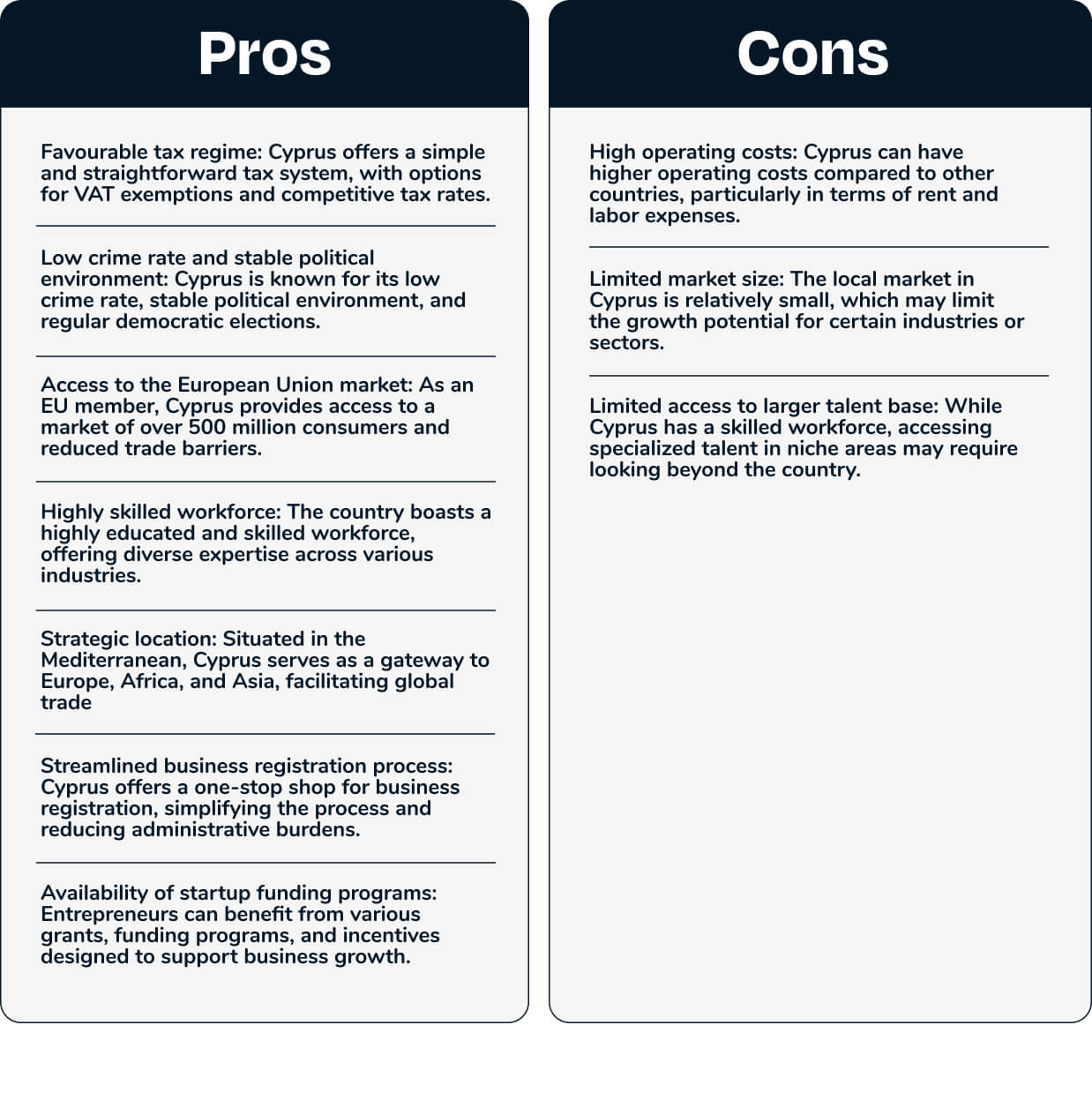Are you considering starting a new business or thinking of international expansion? Assessing the potential advantages and disadvantages of the chosen location should be your priority then. In this blog post, we will explore the pros and cons of starting a business in Cyprus, covering various aspects for you.
Cyprus, with its booming business ecosystem, offers numerous benefits for entrepreneurs. However, it is also important to consider the potential drawbacks too. Let’s now dive into our subtopics for today and discover Cyprus’s business advantages such as the favorable tax regime, access to the European Union market, stable political and economic environment.

Cyprus's Booming Business Ecosystem
Cyprus, known for its strategic location in the middle of the Mediterranean, offers a booming business ecosystem that attracts entrepreneurs from around the world. Just to paint a picture for you, Cyprus is at the crossroads of Europe, Asia and Africa, making the island a unique global potential hub. Whether you are looking to establish a new venture or expand an existing business, Cyprus presents several advantages that make it an attractive geographical destination.
Advantages of Running a Business in Cyprus
- A Favourable Tax Regime: One of the key advantages of establishing a company in Cyprus is its simple and straightforward tax system. The main types of taxes include value-added tax (VAT), income tax, and social security contributions. Cyprus operates with the euro as its currency, providing stability and ease of financial transactions. Businesses pay VAT at a standard rate of 18 percent on most goods and services. However, companies with a turnover lower than €1 million have the option to opt out of paying VAT and instead pay an annual flat fee based on their company size. Moreover, businesses with an annual turnover exceeding €2 million have the choice of different VAT payment options, including full payment, partial payment plus an annual flat fee, or exemption from paying VAT for up to 5 years after registration.
- Low Crime Rate and Stable Political Environment: Cyprus has a low crime rate, it is one of the safest countries in the world. Certainly an important feature for a country close to Asia, Middle East and Africa at the same time. Independent research has consistently ranked Cyprus as a secure destination, offering peace of mind for business owners and residents. On top of national security, the country's stable political situation, with regular elections every five years, provides a conducive environment for businesses to thrive. Additionally, Cyprus is not prone to natural disasters like hurricanes or earthquakes, ensuring a reliable infrastructure, rock-solid consistency and minimal disruption to business operations.
- Access to the European Union Market: As a member of the European Union (EU), Cyprus businessmen enjoys the benefits of being part of a common market with over 500 million consumers. This membership enables businesses to trade freely within the EU without the need for additional visas or complex trade barriers. Entrepreneurs can expand their customer base and explore new business opportunities across Europe.
- Highly Skilled Workforce: Despite its small population size, Cyprus boasts a well-educated and highly skilled workforce. The country has invested significantly in education, resulting in a labour pool that is competent and adaptable. This skilled workforce is equipped with language proficiency and technical expertise, making it easier for businesses to find qualified professionals to support their operations.
- Strategic Location: Cyprus's strategic location provides businesses with a gateway to Europe, Africa, and Asia. It serves as a hub for many companies looking to expand into overseas markets and tap into different resources. The accessibility to these regions opens up opportunities for international trade and collaboration.
- Timely Procedures for Business Registration: Cyprus offers a streamlined process for registering a business. The registration procedure takes approximately three weeks, excluding document preparation. The requirements are not overly complex and do not necessitate specialized knowledge. Entrepreneurs need to choose a unique and non-misleading name for their company, appoint directors who may or may not be residents of Cyprus depending on the company type, and gather the necessary legal documents, a business plan, a bank account, and a tax number, if applicable.
- Startup Funding Programs: Cyprus provides various grants and funding programs to support startups and entrepreneurial ventures. These programs offer financial assistance, mentorship, and resources to help entrepreneurs bring their innovative ideas to life. The availability of startup funding can significantly benefit new businesses in their early stages and foster growth.

Disadvantages of Having a Business in Cyprus
- High Operating Costs: One of the notable disadvantages of operating a business in Cyprus is the relatively high operating costs - compared to its region. Factors such as labor, rent, and utilities can contribute to the overall expenses. The cost of living in Cyprus is also relatively higher compared to some countries in the same region, which can impact the affordability of resources and services for businesses. It is essential for entrepreneurs to carefully evaluate their budget and financial projections to ensure they can manage the operating costs effectively.
- Limited Local Market Size: While the country has enormous potential in its surrounding areas, Cyprus has a relatively small market size compared to larger economies. The country's EU membership provides access to a broader market, its geography is a unique point to serve other countries too, but the local market itself may have limitations in terms of customer base and demand. Businesses that rely heavily on local customers may need to explore international markets or niche segments to achieve substantial growth. It is crucial to conduct market research and develop a comprehensive marketing strategy to identify potential opportunities and target the right audience.
- Limited Access to Larger Talent Base: ACyprus has a highly skilled workforce; however, the size of the local talent pool may be limited compared to larger countries. Industries that require specialised expertise or a larger talent base may face challenges in finding suitable professionals locally. This limitation could potentially affect the scalability and expansion plans of certain businesses. We predict that this disadvantage is losing its relevance since with the availability of remote work options and the ease of travel within the EU, businesses may overcome this challenge by tapping into a broader talent pool beyond Cyprus.
Pros and Cons of Opening a Business in Cyprus
To summarise the advantages and disadvantages of starting a business in Cyprus, you can use the chart below:


Get your Business Account in Cyprus today
Opening a business bank account is a crucial step when starting a business in Cyprus. It provides a secure and efficient way to manage finances, receive payments, and conduct transactions. The process of opening a business bank account in Cyprus has been made more convenient in recent years. Fortunately, now it can be done online without the need to even being in the country. This online option saves time and allows entrepreneurs to focus on other aspects of their business setup.
To open a business account in Cyprus, entrepreneurs will typically need the following documents:
- Company registration documents: These include the certificate of incorporation, memorandum, and articles of association.
- Proof of identity and address: Valid identification documents of the company's directors and authorised signatories, such as passports or national identification cards, along with proof of address.
- Business plan: A comprehensive business plan outlining the company's objectives, financial projections, and strategies.
- Tax identification number: Depending on the type of business and its activities, a tax identification number may be required.
- Certificate of good standing: If the company is already established and operating in another jurisdiction, a certificate of good standing from the respective authorities may be necessary.
- Corporate structure information: Details about the company's structure, shareholders, and beneficial owners.

We advise you to consult with a local bank or financial institution in Cyprus to understand the specific requirements and procedures for opening a business account. Professionals can provide guidance and support throughout the process to ensure a smooth account setup for you.
Starting a business in Cyprus offers several advantages, including a favorable tax regime, a stable political and economic environment, access to the EU market, a highly skilled workforce, and a strategic location. However, you should consider the potential disadvantages, such as high operating costs, limited market size, and limited access to a larger talent base. By carefully weighing the pros and cons, conducting thorough market research, and seeking expert advice, entrepreneurs can make an informed decision about whether or not Cyprus is the right location for their business. In addition to opening a business bank account, they will need to register their company with the relevant authorities, obtain any necessary permits and licences, and comply with local regulations and tax requirements. Only with the right preparation and planning, starting a business in Cyprus can be a rewarding and profitable venture for entrepreneurs.
To mitigate risks and manage sustainable growth, entrepreneurs should conduct thorough market research and seek expert advice before starting a business in Cyprus. They should also develop a comprehensive business plan that takes into account the local market conditions, competition, and regulatory environment. With the right preparation and planning, however, Cyprus can potentially be a lucrative and rewarding location for entrepreneurs looking to start or expand their business.








